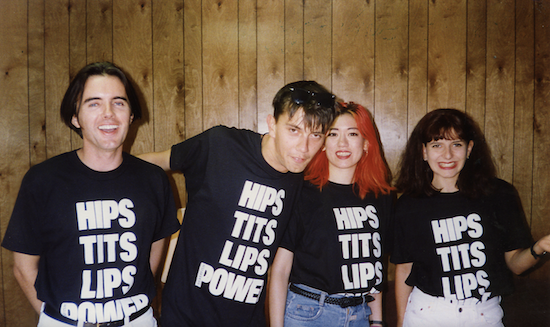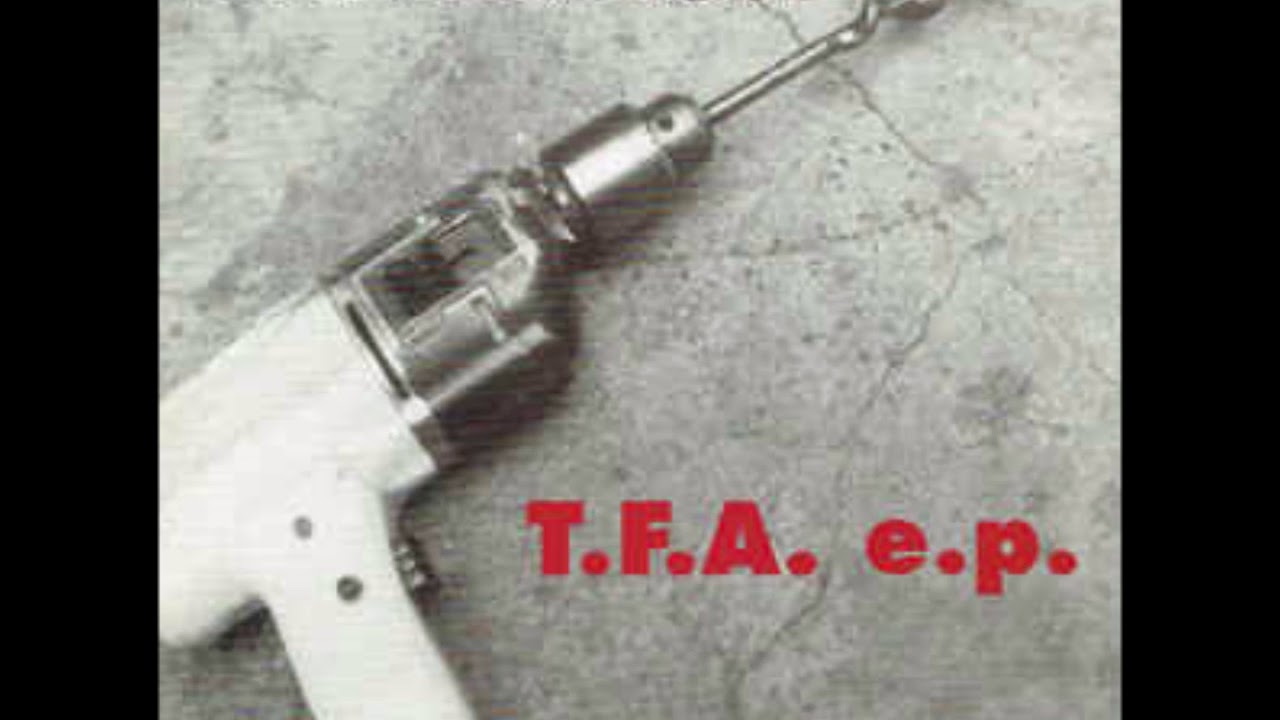Silverfish were a London-based band active from the turn of the 90s. They released two albums and a number of singles and EPs. They toured continuously and supported some bands that subsequently went on to great success. Plenty of people liked Silverfish but they never broke through into the mainstream. Due to interpersonal tensions, they split in 1993.
Such is rock history shorn of myth-making and hyperbole. Silverfish’s story is, when written like this, entirely unremarkable. Like many other bands, they existed, they did things, they ceased to exist.
Consignment to the category of ‘they existed, that’s it’ appears to have become the fate, not just of Silverfish, but of a wide range of artists who were active in this period. Today, the dominant narratives of Anglo-American rock paint the period between the late 80s and mid-90s as a time of epochal transformation: The grunge explosion (and the concomitant eclipse of metal); Manchester bands triumphantly emerging out of the indie scene (and the parallel mass success of rave); Britpop bands creating a newly confident Britishness (and the ejection of the Tories from government).
These grand narratives are not exactly ‘wrong’, but their lazy adoption has ended up marginalising a vast amount of interesting music from innovative artists who were also active at the time. Those – like Silverfish – who do not fit, are reduced to ‘bare life’, their existence occasionally noted but nothing more.
I spoke separately to three of the four members of the band (singer Lesley Rankine, bassist Chris Mowforth and drummer Stuart Watson; guitarist Fuzz was sadly incommunicado) none of them remembered the last time they’d done a Silverfish interview. While they are not entirely forgotten – their 1991 album Fat Axl was re-released as a limited vinyl edition in 2021 – nor have they been revived, re-discovered or re-evaluated.
"It’s like we’ve been wiped off the map", Lesley Rankine tells me. "Maybe we were more like what was happening in the States or something; more like Jesus Lizard or Fugazi and that kind of thing rather than what was happening in Britain."
She may be correct to an extent. I found a webpage that lists Silverfish’s first 111 gigs and it makes for fascinating reading. Silverfish’s first gig was supporting Art Phag at the Camden Falcon in 1988 – the kind of US noise rock band that John Peel would champion, fondly remembered by few. They went on to play with US bands like Boss Hog, Fugazi and Henry Rollins. One of the closest sonic relatives was Babes In Toyland and Rankine mentions them a few times in our interview. And she moved to the US for a few years after Silverfish split, becoming part of the Pigface collective and working on her own music as one half of Ruby.
Yet while it is reasonable to associate Silverfish with the loose grab-bag of noise rock and proto-grunge artists who were subsequently overshadowed by grunge itself, we shouldn’t underestimate the UK scene the band were embedded in. However, what and where that scene actually was is as unclear now as it was then.

Silverfish live in 1989, courtesy of Greg Neate
In an era in which the UK music press sprinkled genre neologisms around like confetti, Silverfish were tagged as part of the ‘Camden lurch’ scene. "Somebody named it after the dance that I used to do, which involved bending over, up and down", Rankine tells me, "that’s probably why I now have a really bad back…" It seems stretching it to call it a scene though. The only other act I can remember that was associated with the Camden lurch was Th’Faith Healers. As Lesley confirms: "Aye, Roxanne used to do the same thing as well, she was probably better at it than me in fact."
Chris Mowforth recalls the Camden lurch and says the weeklies "made it up so they could write about a few different bands". He mentions acts like Sun Carriage, Hair And Skin Trading Company and The God Machine as also being part of whatever it actually was. But really it was as prosaic as a few bands, loosely connected by a sense of noise in their music, who lived closed together and saw each other at gigs. "I mean, My Bloody Valentine lived in a squat up in Kentish town. After the Falcon closed we’d go around their house, just so we could carry on drinking somewhere for a while on a Saturday night."
To muddy the waters further, Stuart Watson tells me that the band grew in part of the "Hammersmith Clarendon scene, the Klub Foot". Although usually associated with psychobilly, upstairs there would be "the Buttholes and more mainline acts, you know? A bit of everything. A bit of garage, punk, whatever. This was pre-Camden, a lot more raunchy, you know?" Indeed, Watson reminds me of the story that him, Chris and Fuzz, who initially formed the band, recruited Lesley after seeing her beating up a guy at the Klub Foot.
That confrontational attitude helped define the band. It was exhilarating to watch Lesley prowl the stage at tiny venues, ‘lurching’ and shouting directly in the audience’s faces (including mine). Hers was the classic story of a small(ish) town girl (from Livingston, Scotland) finding freedom in the big city. As she told me, "It was just me being me. I’ve always been quite in your face. I’m either full on or full off, there is no relaxed mode. It was suddenly acceptable. You know, after 23 years of always being the weirdo at the corner of the playground that nobody else wanted to play with, I became acceptable."
While Rankine might have provided the initial hook, fans stayed for the entire band: Watson’s brutally simple drumming, his kit augmented with a battered fire extinguisher; Mowforth’s monstrous bass and then there was Fuzz…
If Lesley Rankine was a charismatic and striking frontperson, guitarist Fuzz, being a person of colour (with lengthy dreadlocks), was a relatively rare sight in the mainly white UK alternative music underground. A recognisable ‘face’ in the scene for many years, partly due to his DJing at the Camden’s Dublin Castle, his guitar sound was astonishing and novel; a mixture of fuzzed-out noise, dissonant riffs and twisted shards of melody, sprinkled with hints of blues and R&B on top. It all came together perfectly, both as live experience and on record. Early tracks like ‘T.F.A’ were brutally twisted, with a bottom end to die for and a top end to kill for.
Yet Silverfish were too anarchic in their sound and too short-lived to ever settle into a formulaic groove. They sometimes described themselves as noise you can dance to’ and while that may have overstated things, they could certainly forge strangely memorable tunes out of the sonic violence. Late single ‘Crazy’ is, if not hummable exactly, then certainly a song that sticks to your ribs.
‘Crazy’ is also intensely erotic and it was this unabashed and confrontational sexuality that Silverfish became best known for. And yes we are talking about ‘that’ T-shirt. As slogans go, ‘Hips, Tits, Lips, Power’ is exhilarating to read in big letters on someone’s back; the chorus of ‘Big Bad Baby Pigsqueal’ still grabs the attention of the listener.
"It’s still out there", Lesley tells me, "If you go to online T-shirt stores there’s loads of different people producing it. But St. Vincent put something online saying that this was a sexist slogan [after seeing it used as a cover line on the front of Q magazine] and all her followers agreed with her. Lori from Babes In Toyland stepped up and said no, that it was a feminist slogan, which it absolutely was."
Lesley agrees that the song and slogan could be called ‘sex positive’ feminism: "Aye. The song was taking feminine attributes that are usually used against us or to diminish us and taking them back in the same way that some Black people use the N word. I’ve always had that kind of a opinion about sex that women should be able to claim it as their own and be just as sexually open and sexually expressive, as men have always been allowed to be. Where I grew up that was definitely not the case. It was very much the ‘good girls don’t’ attitude that prevailed at the time. From a very early age. I really rebelled against that."

Lush wearing ‘that’ T-shirt in San Francisco 1992, courtesy of Phil King
After I spoke to Lesley Rankine, I was browsing old Silverfish live videos on YouTube when it struck me how, in their later years she often appeared on wearing a floral dress, sometimes along with a shaved head. I emailed her to ask whether this was a deliberate strategy, to combine the most ‘feminine’ signifiers with something more subversive. She agreed: "It feels like my whole life I’ve been kicking against gender norms, or at least, expectations of gender. I’ve always felt the need to stick a spanner in the works of the traditional ideas of gender identity. When I was a kid I had short hair and liked to climb stuff so I was constantly called a boy. In Silverfish, quite a few reviewers called me a wannabe man. I’ve always been fiercely proud of being female so all those slanders really stuck in my craw. I’m a woman – I like frocks… and big boots… and loud music… and lots of things that are traditionally tagged as ‘male’. And most blokes I know are partial to a scatter cushion or two. This is normal. What is not normal is the traditional polarising of the genders."
I can’t help feeling that Lesley Rankine came along just a bit too soon. She had to face endless interviews about what it was like to be a woman in a band ("The women in rock thing. I heard that phrase so many fucking times…") Coverage of Silverfish usually emphasised the confrontation and often ignored the sex, the unabashed desire expressed in songs like ‘Crazy’ or ‘Pink And Lovely’. Her subsequent career with Ruby, where the eroticism was less hidden, didn’t find the audience it deserved. Just as Silverfish the band rarely fits into the standard narratives of their era, so Lesley Rankine herself has been unjustly marginalised.
Above all, Silverfish were filthy and perhaps that is the key distinction between late 80s/early 90s alternative music and the genteel dirt of Britpop that came to dominate by the end of the 90s. Had Silverfish survived, it’s impossible to imagine her playing the game and spouting mannered, mildly-controversial opinions in lad mags.
The end of Silverfish in 1993 was relatively undramatic. They had toured incessantly right from their first gig in 1988, exacerbating personal tensions, particularly between Fuzz and Rankine. She lived in the US for a while, recording and touring with Ruby and Martin Atkins and William Rieflin’s collaborative project Pigface. The last few years have seen her return to Scotland, and while motherhood and the need to earn a living has meant that music has taken a back seat, she is still keen to return to it. That won’t be with Silverfish though. None of the three members I spoke to have much interest in a reunion, although they are occasionally in touch. Mowforth and Watson did play (separately from each other) in various under-the-radar bands over the years, but the pandemic saw them both ease into semi-retirement. Fuzz is currently keeping a low profile; a real shame.

Silverfish live in 1989, courtesy of Greg Neate
All in all though, it’s a relatively civilised way for a bunch of musicians to fade back into history. I can’t help feeling some sadness though. It’s not that I am dying to hear more Silverfish music – their canon is perfectly-formed as it stands – but they are symptomatic of how the musical promise of the late 80s and early 90s, ended up being squandered. While I don’t think it’s correct to say ‘grunge killed them’ (and even more wrong to say that ‘Britpop killed them’) I do think that Silverfish were one of a number of bands who offered up a dazzling array of new musical ideas, only for this vibrancy to be lost as the 90s turned into the era that birthed Nickelback and Shed 7. The 90s were a decade of musical levelling as the desire to hype musical movements happen infected the music industry and journalists who should have known better.
It may still be hard to place Silverfish into a clearly-definable movement, but that was the point: For a few years the loose-knit ‘alternative’ scene became a space of possibility, bound together less by a shared musical vision than by a desire to be different.
One Silverfish gig encapsulates this: On 31 March 1990, they played alongside Carter The Unstoppable Sex Machine and Cud, supporting Birdland. There is nothing much in common between those bands and history hasn’t been kind to all of them, but the shambolic incoherence of the lineup is exactly what we should treasure. And the collective ‘reach’ of the bands was incredibly wide, none more so than Silverfish. This was a band that could play with Fudgetunnel, MBV, Godflesh or Fugazi and then go on to fit perfectly well on a bill with bands a million miles away. They represent, perfectly, something great that has been lost.




